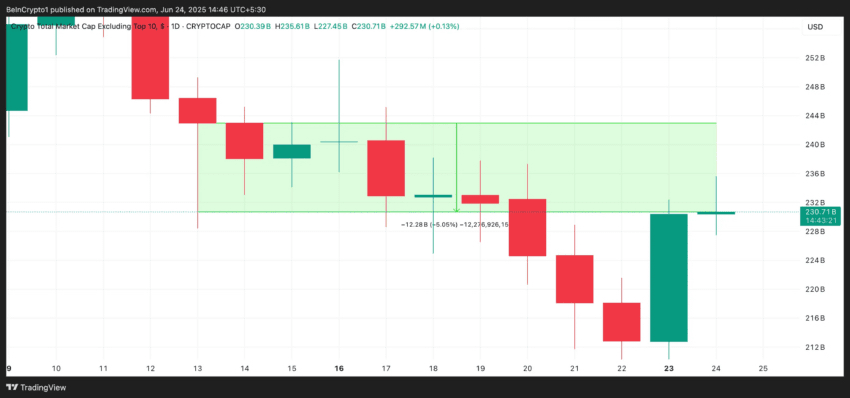The escalating conflict between Israel and Iran has cast a long shadow over financial markets, with cryptocurrencies being no exception.
While Bitcoin (BTC) has managed to show some resilience, attempting to stay above the $100,000 mark, altcoins are collapsing under geopolitical pressure, leading to their performance trailing significantly behind the leading currency.
Bitcoin's market share is growing.
Since June 13, after Israel launched a major operation against Iran, Bitcoin's dominance has increased. It currently stands at 65.30%, up nearly 1% since the first Israeli attack. In contrast, the market capitalization of altcoins, excluding the top ten currencies, has declined during the same period.
The company OTHERS, which tracks the market share of alternative currencies, continued its decline, currently valued at $230.08 billion. Meanwhile, the ETH/BTC ratio has decreased, noting that Ethereum, along with most altcoins, has continued to perform below BTC.
Even the leading currency has struggled to maintain its upward momentum, further weakening the alternative currency market overall. All indications point to one outcome: the altcoin season may not be ready yet.
Bitcoin's dominance grows despite instability in the Middle East.
Agne Linge, Head of Growth at WeFi, confirmed that during periods of global turmoil like this, it is not uncommon for investors to move their capital to assets they consider safer:
Linge explained: "Typically, during global conflicts that affect political and macroeconomic stability, investors tend to shift their capital from risky assets to those considered safe havens." He added: "Gold and Treasury bonds were the preferred options previously; however, we now see Bitcoin representing a safe digital haven."
According to Linge, with the ongoing conflict between Israel, Iran, and the United States, this capital shift is noted in the decline of investments in others. At the time of publishing, this figure stood at $230.71 billion, losing $12 billion in ten days.
The market capitalization of altcoins, excluding the top ten currencies, immediately dropped as the conflict escalated. This indicates that traders shifted their capital allocations from altcoins to safe havens like Bitcoin and stablecoins.
 It also noted that the rise in Bitcoin's dominance amidst the ongoing conflict confirms capital rotation towards the currency:
It also noted that the rise in Bitcoin's dominance amidst the ongoing conflict confirms capital rotation towards the currency:
Linge stated: "BTC.D refers to Bitcoin's dominance over alternative currencies, and it has been increasing since the onset of the conflict."
At the time of writing this report, Bitcoin's dominance was 65.30%. To clarify, it briefly rose to a multi-year high of 65.95% on Sunday before retracting slightly. During the same period, the ETH/BTC ratio declined.
The ETH/BTC ratio is also an important indicator, as most altcoins rely on the Ethereum blockchain, and a rise in this ratio means Ethereum is outperforming Bitcoin. This ratio has declined since June 16 and has remained steady.
These readings indicate that even with BTC's relatively stagnant price, its dominance in the market remains strong, leading to further delays in the altcoin season.
The "Bitcoin Season" is still ongoing.
Readings from the altcoin season index indicate that the market is still in a Bitcoin dominance phase. The altcoin season begins when at least 75% of the top 50 altcoins outperform Bitcoin over a 90-day period.
According to Blockchain Center, only 16% managed to do so over the past ninety days, demonstrating a lag in altcoin performance and suggesting that the real altcoin season is still far off.